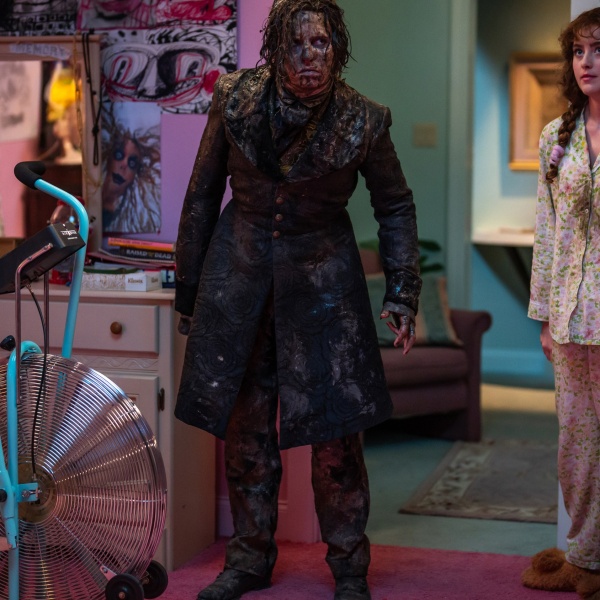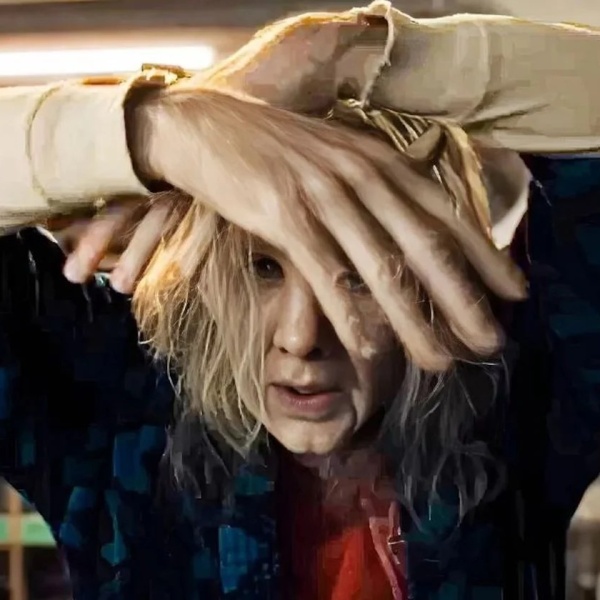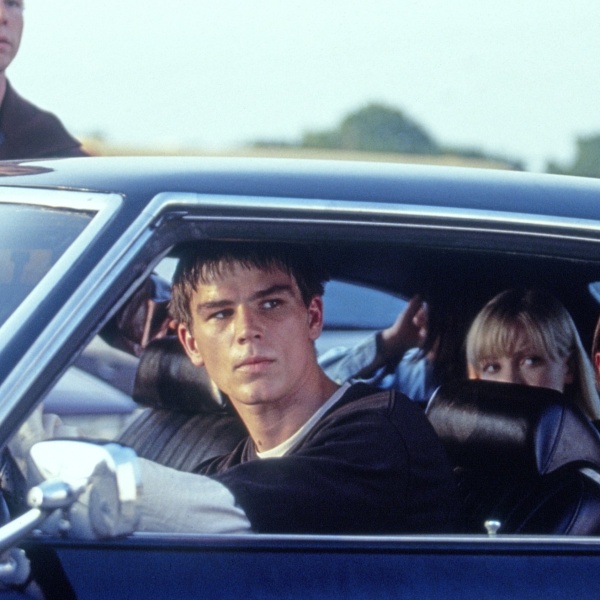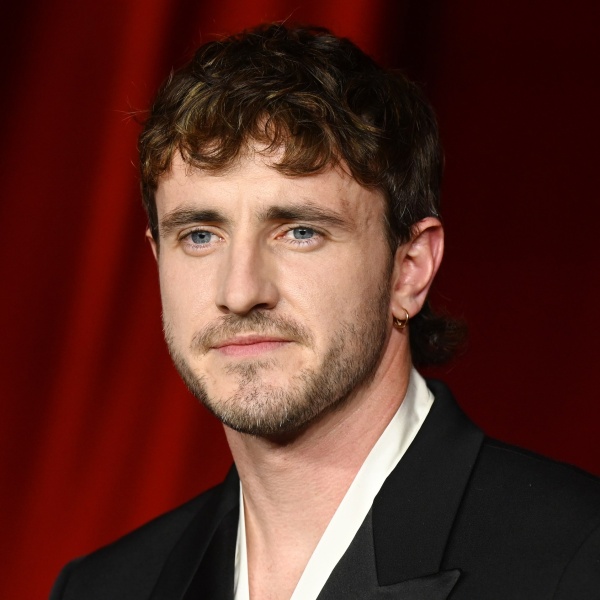
It was a call from David Fincher that lured Trent Reznor and Atticus Ross, the two frontmen of iconic ’90s-launched industrial rock band Nine Inch Nails, into writing music for movies. Beginning with the Oscar-winning Silicon Valley dissonance of “The Social Network,” “The Girl with the Dragon Tattoo,” “Gone Girl” (“that one falls through the cracks in our ‘illustrious’ discography,” Reznor joked in our interview), and “Mank” followed for Fincher, with scores for Disney/Pixar’s “Soul,” Damon Lindelof’s HBO series “Watchmen,” and Netflix’s flagship original thriller “Bird Box” in between.
Now, Reznor and Ross, based in L.A. where they Zoomed with IndieWire from their studio, are the close creative confidantes of Luca Guadagnino, having scored “Bones and All” first before the electro-amped, ’90s-club-music-inspired “Challengers” and the more woodwind-textured languor of “Queer” landed the composers back in the Oscar race. The instantly all-timer “Challengers” score — thrumming like a propulsive musical libido under the sweaty tennis court antics of Tashi (Zendaya), Patrick (Josh O’Connor), and Art (Mike Faist) — has already picked up a raft of critics’ prizes and is unlike any score ever to compete for a Best Original Score Oscar.
The same goes for every other Reznor-and-Ross score.
Reznor said that, outside the bracket of Nine Inch Nails, he and Ross have flourished as film composers because they’re “working in service to something, where we’re not in control of the whole thing, and we’re working intimately with a director or small team to try and help realize a collective vision, solving that riddle without the burden of ‘how’s it going to be marketed?’ and all the things.”
They first worked with Italian filmmaker Guadagnino on the sick but sweet cannibal romance “Bones and All,” with Reznor and Ross now becoming one of the director’s first stops while a movie is heading into production. In the case of the highly danceable “Challengers,” he pointed them to club music out of Berlin.
“What we’re looking for [from film] is the collaborative experience with interesting people. We haven’t gotten that from the music world necessarily, for our own choice,” Reznor said. “You mentioned disillusionment with the music world? Yes. The culture of the music world sucks. That’s another conversation, but what technology has done to disrupt the music business in terms of not only how people listen to music but the value they place on it is defeating. I’m not saying that as an old man yelling at clouds, but as a music lover who grew up where music was the main thing. Music [now] feels largely relegated to something that happens in the background or while you’re doing something else. That’s a long, bitter story.”
As for Guadagnino’s process, Ross said, “Luca’s not a micromanager. All the films are radically different. Going back to ‘Bones and All,’ I think an acoustic guitar was the extent of his influence on the score [‘Paris, Texas’ and ‘Brokeback Mountain’ were also on the vision board]. With ‘Challengers,’ when he mentioned dance music, what you’re faced with, with any film, is ‘what is the best way to tell the story?’ There’s no question in my mind looking back that the best way to tell the story of ‘Challengers’ was the vessel of dance music. It just brought the film to life in a way that felt like — I think you can use the word visionary for Luca. He has a holistic idea for what his films mean, and there’s no end to his commitment.”
Reznor said the process with Luca starts informally. “‘Hey, I’m making a picture that’s going to be super sexy, a very sexy drama, a love triangle set against tennis as a backdrop.’ OK. Then, we’ll read the script, which has a lot of clues in it, but the script only tells part of the story with Luca … what comes back from picture is something that, wow, it is the script, but realized in a way I [hadn’t] realized.”
Whereas on “Bones and All” Guadagnino got out of their way and let the composers experiment, “With ‘Challengers,’ it was much more, right off the bat, he came to us and said, ‘I think music should be a character in the film. It should be unavoidable. It should be propelling. I want the audience to feel like they can dance in their seats to the whole thing like it’s a fucking rave. I want it to be aggressive. I want to make the movie fun.’ OK, let’s see what happens,” Reznor continued.
The composers first saw “Challengers” with no music and only placeholder needle drops. “As soon as we started dropping in tracks … it really did change the way it felt,” Reznor said. “Did we know he was going to be daring enough to have that kind of music drop in on an argument in the bedroom at full volume? No we didn’t. It’s inspiring to see the courage he exhibited in making those calls and sticking with them.”
Reznor said that something they learned composing the pulsing and apocalyptic music for HBO’s graphic novel adaptation “Watchmen” was “if you’re going to have driving music play through a scene, it has to be driving music. It can’t be politely sitting behind explosions and car chases and dialogue. It needs to feel like you’re in a club.” Which is absolutely the case in “Challengers,” where the relentlessly driving synth beats are as much a character as the actors. “If it’s not loud enough, it gets marginalized and just doesn’t work at all. We know the problems that come when it’s either the sound effects guys you’re ready to get into a fist fight with in the mixing room or the studio executive that can’t hear the dialogue. [Luca] was fighting that fight through the process.”
Ross stressed that with “Challengers,” “It’s not style over substance. He’ll send us a list, like ‘I need a Patrick and Art theme, I need a Tashi theme, I need a threesome theme.’ Buried within those different pieces, they all represent part of the storytelling that we’re doing.” Regarding the argument in the bedroom between Tashi and Patrick, “where the music is playing kind of at the same level as the dialogue, if you watch that scene without it … it’s a totally different experience.”
Onto “Queer,” where Reznor and Ross went so far as to embed the words of writer William S. Burroughs into the lyrics of the main theme, “Vaster Than Empire”: “How can a man who sees and hears be anything other than sad?” The score itself — more orchestral than anything they’ve done for Guadagnino so far — also has to capture the mind space of an alcoholic, longing-in-love writer (here Daniel Craig playing William Lee, a version of Burroughs) chasing an elusive love object (Drew Starkey) all the way to the jungles of Ecuador. There, Craig and Starkey’s characters take ayahuasca and engage in a choreographed body-entwining dance that’s like ballet on LSD.
Their approach to that piece of music was almost like an overture medley for a classic Hollywood musical, where all the motifs and elements of the score throughout are put into a blender.
“Essentially, the idea of the ayahuasca scene, if you were to go through it with a magnifying glass, is you’ve heard these various themes between Allerton and Lee leading up to that moment,” Ross said, “And they take the ayahuasca, and we came up with this process of treating the music that turned it into a more psychedelic version. Hidden in that ayahuasca scene are lots of bits and pieces of the most meaningful bits of music to their relationship, delivered in a more psychedelic container. In terms of hitting the beats of their dance, that was us working with the picture,” rather than providing music to the choreographers first.
Reznor pointed to the “unexpected trap” of “Challengers” being “what if you could use the construct of dance music to score the film? There was immediate satisfaction in the concept, but you realize they’re not cutting anything to our music, so you’ve got to have something that now has to pass as dance music and has to have a fairly rigid tempo … that metronomical prison of [needing that to] work, set against infinite stuff that needed to be scored and emphasized, became a trigonometric [challenge]. There’s some fucking calculating going on … because you had something that wasn’t as easy to cheat.”
Up next, Reznor and Ross recently confirmed they will be scoring Luca Guadagnino’s next film, the contemporary thriller “After the Hunt” starring Julia Roberts and now in post-production, and it’s assumed they’ll score Guadagnino’s “American Psycho” reimagining, which is still in development with screenwriter Scott Z. Burns.
As a Nine Inch Nails fan, I had to ask Reznor whether the controversial 1997 video album “Closure,” which contains footage from the band’s Self-Destruct and Further Down the Spiral tours, will ever see the light of day on home viewing again. It was released as a double VHS that year and includes on- and backstage antics, including many of the tour’s guests, including David Bowie, Jim Rose Circus, and Marilyn Manson (that could present an issue). Interscope Records, NIN’s label from 1992 until 2007 when Reznor pivoted to self-releasing his material, planned and then shelved a DVD release in 2004.
“I’m trying to think what I’m able to say right now,” Reznor said. “We are doing some things with Interscope again. There’s a renewed interest in making sure the back catalog is being curated and maintained properly. I’ll bring that up as — I haven’t been paying close attention to what the status of those things are because this is a relatively new development. But that’s a good thing to mention because I would like to have that in some consumable fashion, whether it be streamable or something.”
Someone did leak a pirated version of “Closure” online at one point, though. “Oh, I wouldn’t know anything about that,” Reznor said.




